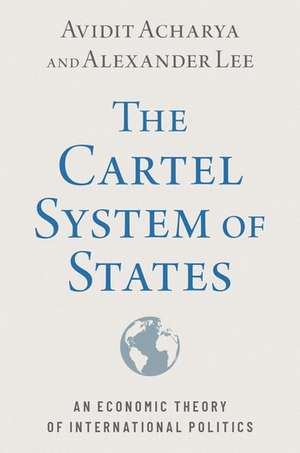The Cartel System of States: An Economic Theory of International Politics
Autor Avidit Acharya, Alexander Leeen Limba Engleză Paperback – 23 mar 2023
Preț: 133.86 lei
Preț vechi: 154.16 lei
-13% Nou
Puncte Express: 201
Preț estimativ în valută:
25.62€ • 26.43$ • 21.68£
25.62€ • 26.43$ • 21.68£
Carte disponibilă
Livrare economică 31 ianuarie-06 februarie
Livrare express 25-31 ianuarie pentru 43.01 lei
Preluare comenzi: 021 569.72.76
Specificații
ISBN-13: 9780197632277
ISBN-10: 0197632270
Pagini: 224
Dimensiuni: 235 x 155 x 14 mm
Greutate: 0.33 kg
Editura: Oxford University Press
Colecția OUP USA
Locul publicării:New York, United States
ISBN-10: 0197632270
Pagini: 224
Dimensiuni: 235 x 155 x 14 mm
Greutate: 0.33 kg
Editura: Oxford University Press
Colecția OUP USA
Locul publicării:New York, United States
Recenzii
In The Cartel System of States, Acharya and Lee analyze rulers as monopoly providers of governance services to citizens, who collude with rulers of other countries to restrict competition and protect their local monopolies. They use their theory to interpret the rise of the modern state system, and to analyze the challenges it faces in the current international political and economic environment. The Cartel System of States presents a striking and systematic argument and evidence that will be of interest to all scholars of international politics.
In this ambitious analysis, Acharya and Lee deploy the tools of political economy to explain the stability and form of the modern state system. In their model, states are collusive arrangements, in which rulers divide territory among themselves to maximize the benefits of ruling. The authors reveal the surprising sources of cartel stability and draw out the implications of their theory for the study of territorial conflict, nationalism, and international institutions. The result is insightful and deeply provocative.
This provocative book provides a novel perspective on the international state system and its operation. It maintains that governments across the globe and over time have created and perpetuated a cartel to monopolize the governance of their citizens. Cartel theory implies a revised history of the international state system and opens up new ideas for how that system has changed and might change in the future.
Why is the world organized into countries with mutually recognized boundaries? Acharya and Lee's book presents a pathbreaking new answer based on the idea that potential rulers compete in a market to govern citizens and that the territorial state system that structures world politics reflects cooperation among rulers to avoid competition and extract as much as possible from citizens. This amazing book establishes this idea as a powerful lens for understanding how globalization, nationalism, state failure, and international institutions have and will shape cooperation and conflict within and between states. The book is a fantastic achievement and a must read for anyone interested in international relations.
A wholly original and illuminating perspective on the delineation and maintenance of nation-state boundaries. Starting from beguilingly simple premises of the need for governance and the logic of the cartel, Acharya and Lee clarify the logic behind much of the history of international relations. The insights it affords are likely to be the port of departure for much subsequent work.
In this ambitious analysis, Acharya and Lee deploy the tools of political economy to explain the stability and form of the modern state system. In their model, states are collusive arrangements, in which rulers divide territory among themselves to maximize the benefits of ruling. The authors reveal the surprising sources of cartel stability and draw out the implications of their theory for the study of territorial conflict, nationalism, and international institutions. The result is insightful and deeply provocative.
This provocative book provides a novel perspective on the international state system and its operation. It maintains that governments across the globe and over time have created and perpetuated a cartel to monopolize the governance of their citizens. Cartel theory implies a revised history of the international state system and opens up new ideas for how that system has changed and might change in the future.
Why is the world organized into countries with mutually recognized boundaries? Acharya and Lee's book presents a pathbreaking new answer based on the idea that potential rulers compete in a market to govern citizens and that the territorial state system that structures world politics reflects cooperation among rulers to avoid competition and extract as much as possible from citizens. This amazing book establishes this idea as a powerful lens for understanding how globalization, nationalism, state failure, and international institutions have and will shape cooperation and conflict within and between states. The book is a fantastic achievement and a must read for anyone interested in international relations.
A wholly original and illuminating perspective on the delineation and maintenance of nation-state boundaries. Starting from beguilingly simple premises of the need for governance and the logic of the cartel, Acharya and Lee clarify the logic behind much of the history of international relations. The insights it affords are likely to be the port of departure for much subsequent work.
Notă biografică
Avidit Acharya is Professor of Political Science at Stanford University. His research is in the fields of political economy and game theory as it applies to the study of politics. He is the co-author of Deep Roots: How Slavery Still Shapes Southern Politics. Alexander Lee is Associate Professor of Political Science at the University of Rochester. His research focuses on the politics of South Asia, the process of economic and political development, and the role of historical forces and events in shaping modern politics. He is the author of Development in Multiple Dimensions: Social Power and Regional Policy in India and From Hierarchy to Ethnicity: The Politics of Caste in Twentieth-Century India.
